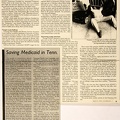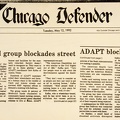Chicago Sun Times, 3/13/92
TWO PHOTOS by Sun-Times photographer Al Podgorski: First photo is of a person (Eilene Spitfire Sable) in a helmet and white sweatshirt making a peace sign as she faces off with a uniformed Chicago police officer, over a police barricade. Spitfire faces away from the camera and teh officer's face is somewhat obscured by her hand and the visor on his hat.
On Spitfire's back are the words "NEVER SURRENDER."
Second picture is of two trim uniformed Chicago police officedrs holding on to the wheelchair and arm of a large man in a manual chair (Jerry Eubanks,) Jerry, who has no legs, is leaning to one side and has his head hanging over. His button down shirt has come mostly open and hs is grimmacing. Behind this trio, a crowd of ADAPT protesters (including Lujuina Votaw) are sitting together, guarded by more uniformed officers.
Caption reads: Disabled rights activists keep police busy Tuesday at the American Medical Associatlon building. LEFT: Eileen Sabel of Phlladelphia takes a peaceful approach. RIGHT: A protester is removed after blocking a van that contained an arrested demonstrator.
Disabled take home-care protest to AMA's doorstep
By Larry Weintraub, Staff Writer
ln a third day of protests in support of home care instead of nursing home admissions, disabled rights activists Tuesday disrupted traffic and activities at the American Medical Association headquarters at Grand and State.
Four demonstrators were arrested and one was injured. Two police officers were hurt and streets around the AMA building were blocked—first by protesters in wheelchairs and later by police.
The demonstrators arrived at about 11:30 a.m. and surrounded the building at 515 N. State, said police Area 6 Chief of Patrol John Walsh.
About six hours later, police officers escorted a caravan of wheelchairs south on State toward the Bismarck Hotel, where the group, American Disabled for Attendant Programs Today (ADAPT), has been staying.
In the interim, the activists pounded on windows, shouted slogans, blocked entrances and generally tried to shut down the building. When the AMA began sending workers home at 3:30 p.m., about 20 demonstrators dropped out of their wheelchairs and crawled to confrontational positions.
One man, Michael Auberger, 38, of Denver, was charged with battering a police officer. Officials said he rammed his mechanized wheelchair into East Chicago District Patrol Officer Robert Weston, injuring Weston's leg.
The injured protester, a 38-year-old man who asked that his name be withheld, was treated for bruises at Northwestern Memorial Hospital and released. The other disabled persons arrested, a man and two women, were charged with disorderly conduct.
ADAPT members, about 300 from 40 cities in 25 states, are holding a national convention here. They have been protesting the amount of federal and state funds spent on housing disabled people in nursing homes, rather than on attendants whose assistance would permit them to live at home, according to one spokesman, Mark Johnson of Atlanta.
Johnson said his group targeted the AMA Tuesday “because nobody can go into a nursing home without a physician's referral, so they can play a pivotal role in reforming the system."
Johnson said the lack of money for in-home care forces disabled people who could get along on their own with minimal assistance “to go on public aid and to live where they don't want to live."
In-home care is far cheaper than nursing home residence, he said, and 80 percent of disabled people who live in nursing homes would rather live at home.
Joanne Schwartzberg, director of the AMA‘s department of geriatric health, said the association agrees that “home care is the first choice for long-term care" and the AMA has a long history of support for it. However, the organization can only suggest guidelines to its members, she said.
“Most disabled persons obviously don't belong in nursing homes." said Schwartzberg, “and we offered at a meeting last Thursday to work with them toward mutual goals—increasing the amount of home care and possibly drawing model home-care legislation for states that have no such provisions."
The group demonstrated Sunday at the University of Illinois at Chicago, where Health and Human Services Secretary Louis Sullivan was speaking, and Monday at 105 W. Adams. where the department has offices. ADAPT plans to move its protest to the State of Illinois Center today.
Meanwhile Tuesday, two women who use wheelchairs filed a class-action federal lawsuit charging that "oppressive" security measures Monday at the State of Illinois Center denied them equal access to facilities there.
An emergency hearing on the matter is scheduled for today before U.S. District Judge Milton I. Shadur.
Contributing: Jim Casey, Rosalind Russi
- Author
- Chicago Sun Times /Larry Weintraub photos Al Podgoskir
- Created on
- Friday 12 July 2013
- Posted on
- Thursday 29 November 2018
- Tags
- ADAPT - American Disabled for Attendant Programs Today, AMA - American Medical Association, Bismarck Hotel, blocking paddy wagons, crawling, disrupt traffic, doctor's referral, Dr. Joanne Swartzberg, hospital, in home services cheaper, Jerry Eubanks, lawsuit, Lujuina Votaw, Mark Johnson, Michael Auberger, peace sign, percent of money for nursing homes versus community attendant services, Secretary Louis Sullivan, shutting down building, Spitfire, US District Judge Milton Shadur
- Albums
- Visits
- 943
- Rating score
- no rate
- Rate this photo


0 comments